Connection between Historical Periods Literature
VerifiedAdded on 2023/03/17
|7
|1471
|67
AI Summary
This essay explores the connection between four chosen pieces of literature from the historical periods of modernity and the Enlightenment Philosophy. The chosen works include Francis Bacon's The Novum Organum, Martin Luther King Jr.'s Letter from Birmingham Jail, James Madison's Federalists No. 10, and Thomas Hobbes' The Leviathan. The essay discusses the main ideas and themes of each work and highlights the common thread of emancipatory ideals and the preservation of societal structure. The works reflect the influence of the Enlightenment Philosophy and its emphasis on reason, progress, and social change.
Contribute Materials
Your contribution can guide someone’s learning journey. Share your
documents today.
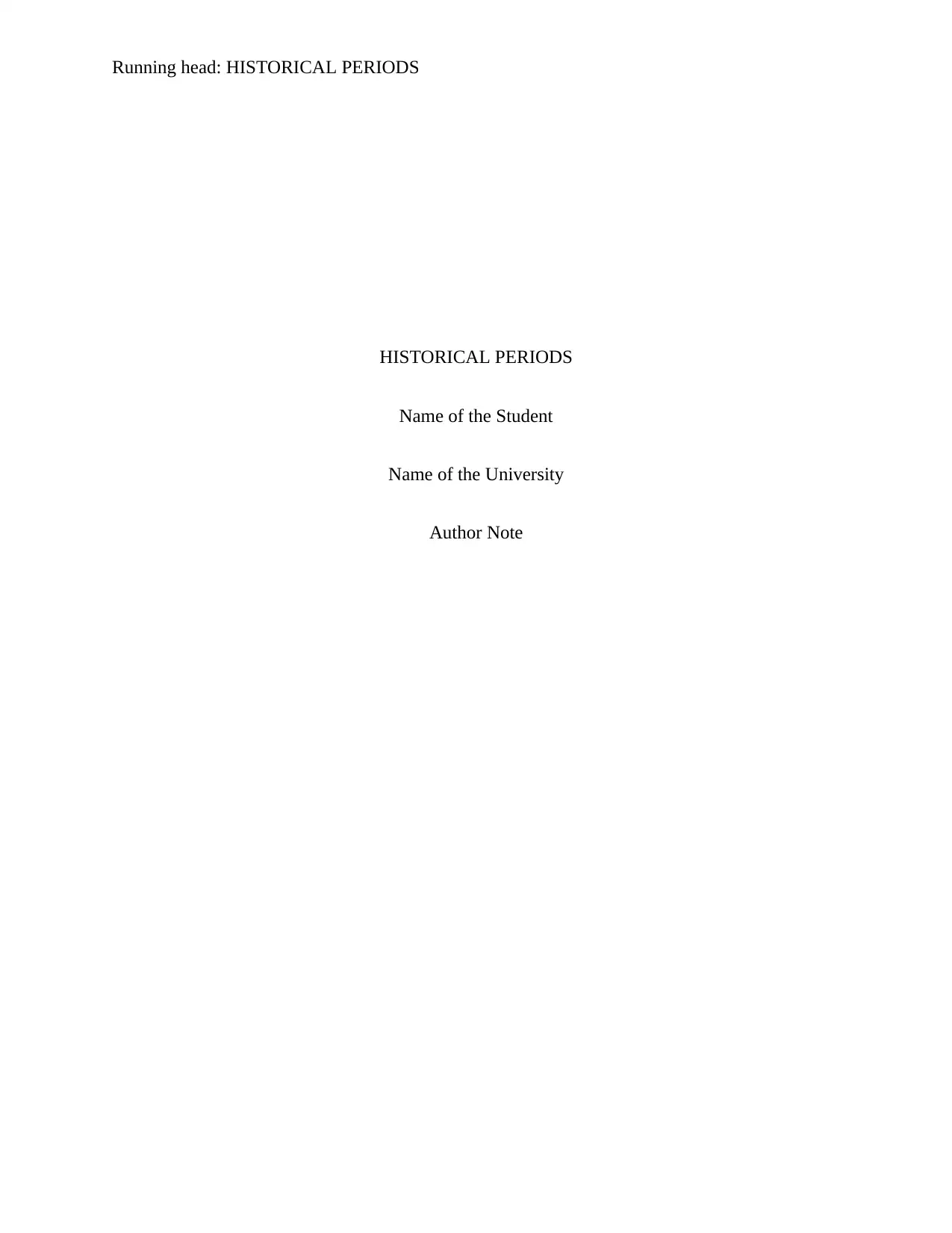
Running head: HISTORICAL PERIODS
HISTORICAL PERIODS
Name of the Student
Name of the University
Author Note
HISTORICAL PERIODS
Name of the Student
Name of the University
Author Note
Secure Best Marks with AI Grader
Need help grading? Try our AI Grader for instant feedback on your assignments.
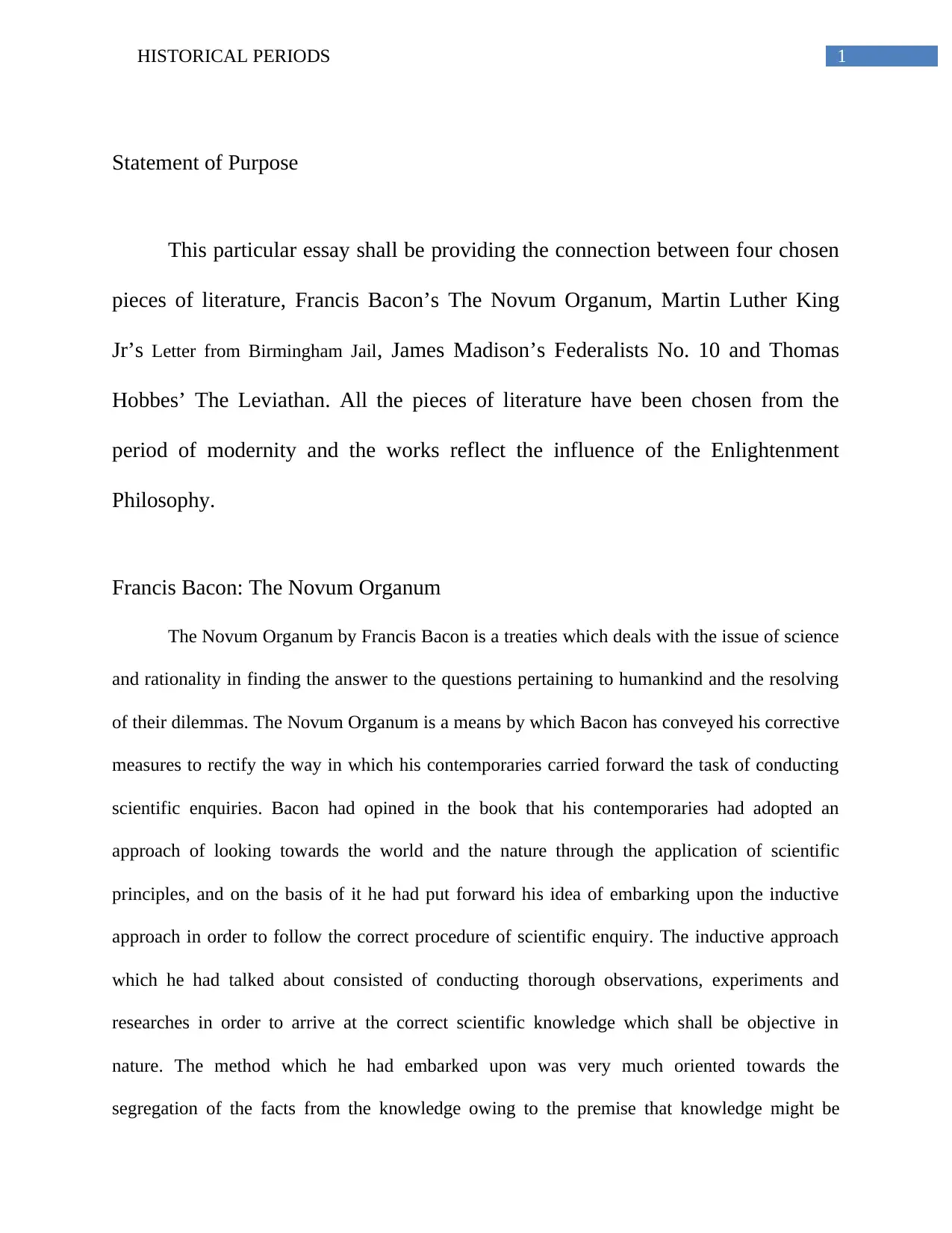
1HISTORICAL PERIODS
Statement of Purpose
This particular essay shall be providing the connection between four chosen
pieces of literature, Francis Bacon’s The Novum Organum, Martin Luther King
Jr’s Letter from Birmingham Jail, James Madison’s Federalists No. 10 and Thomas
Hobbes’ The Leviathan. All the pieces of literature have been chosen from the
period of modernity and the works reflect the influence of the Enlightenment
Philosophy.
Francis Bacon: The Novum Organum
The Novum Organum by Francis Bacon is a treaties which deals with the issue of science
and rationality in finding the answer to the questions pertaining to humankind and the resolving
of their dilemmas. The Novum Organum is a means by which Bacon has conveyed his corrective
measures to rectify the way in which his contemporaries carried forward the task of conducting
scientific enquiries. Bacon had opined in the book that his contemporaries had adopted an
approach of looking towards the world and the nature through the application of scientific
principles, and on the basis of it he had put forward his idea of embarking upon the inductive
approach in order to follow the correct procedure of scientific enquiry. The inductive approach
which he had talked about consisted of conducting thorough observations, experiments and
researches in order to arrive at the correct scientific knowledge which shall be objective in
nature. The method which he had embarked upon was very much oriented towards the
segregation of the facts from the knowledge owing to the premise that knowledge might be
Statement of Purpose
This particular essay shall be providing the connection between four chosen
pieces of literature, Francis Bacon’s The Novum Organum, Martin Luther King
Jr’s Letter from Birmingham Jail, James Madison’s Federalists No. 10 and Thomas
Hobbes’ The Leviathan. All the pieces of literature have been chosen from the
period of modernity and the works reflect the influence of the Enlightenment
Philosophy.
Francis Bacon: The Novum Organum
The Novum Organum by Francis Bacon is a treaties which deals with the issue of science
and rationality in finding the answer to the questions pertaining to humankind and the resolving
of their dilemmas. The Novum Organum is a means by which Bacon has conveyed his corrective
measures to rectify the way in which his contemporaries carried forward the task of conducting
scientific enquiries. Bacon had opined in the book that his contemporaries had adopted an
approach of looking towards the world and the nature through the application of scientific
principles, and on the basis of it he had put forward his idea of embarking upon the inductive
approach in order to follow the correct procedure of scientific enquiry. The inductive approach
which he had talked about consisted of conducting thorough observations, experiments and
researches in order to arrive at the correct scientific knowledge which shall be objective in
nature. The method which he had embarked upon was very much oriented towards the
segregation of the facts from the knowledge owing to the premise that knowledge might be
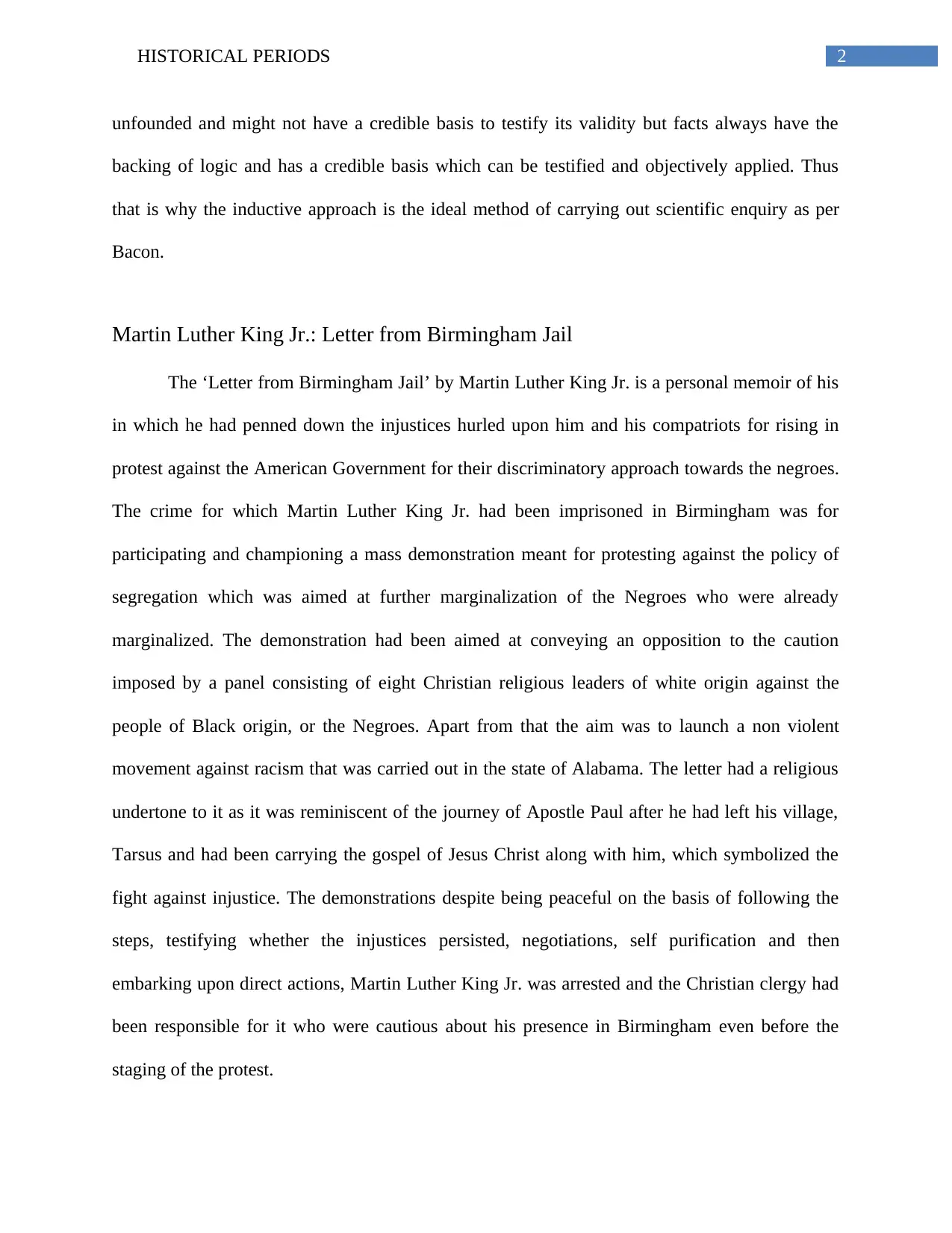
2HISTORICAL PERIODS
unfounded and might not have a credible basis to testify its validity but facts always have the
backing of logic and has a credible basis which can be testified and objectively applied. Thus
that is why the inductive approach is the ideal method of carrying out scientific enquiry as per
Bacon.
Martin Luther King Jr.: Letter from Birmingham Jail
The ‘Letter from Birmingham Jail’ by Martin Luther King Jr. is a personal memoir of his
in which he had penned down the injustices hurled upon him and his compatriots for rising in
protest against the American Government for their discriminatory approach towards the negroes.
The crime for which Martin Luther King Jr. had been imprisoned in Birmingham was for
participating and championing a mass demonstration meant for protesting against the policy of
segregation which was aimed at further marginalization of the Negroes who were already
marginalized. The demonstration had been aimed at conveying an opposition to the caution
imposed by a panel consisting of eight Christian religious leaders of white origin against the
people of Black origin, or the Negroes. Apart from that the aim was to launch a non violent
movement against racism that was carried out in the state of Alabama. The letter had a religious
undertone to it as it was reminiscent of the journey of Apostle Paul after he had left his village,
Tarsus and had been carrying the gospel of Jesus Christ along with him, which symbolized the
fight against injustice. The demonstrations despite being peaceful on the basis of following the
steps, testifying whether the injustices persisted, negotiations, self purification and then
embarking upon direct actions, Martin Luther King Jr. was arrested and the Christian clergy had
been responsible for it who were cautious about his presence in Birmingham even before the
staging of the protest.
unfounded and might not have a credible basis to testify its validity but facts always have the
backing of logic and has a credible basis which can be testified and objectively applied. Thus
that is why the inductive approach is the ideal method of carrying out scientific enquiry as per
Bacon.
Martin Luther King Jr.: Letter from Birmingham Jail
The ‘Letter from Birmingham Jail’ by Martin Luther King Jr. is a personal memoir of his
in which he had penned down the injustices hurled upon him and his compatriots for rising in
protest against the American Government for their discriminatory approach towards the negroes.
The crime for which Martin Luther King Jr. had been imprisoned in Birmingham was for
participating and championing a mass demonstration meant for protesting against the policy of
segregation which was aimed at further marginalization of the Negroes who were already
marginalized. The demonstration had been aimed at conveying an opposition to the caution
imposed by a panel consisting of eight Christian religious leaders of white origin against the
people of Black origin, or the Negroes. Apart from that the aim was to launch a non violent
movement against racism that was carried out in the state of Alabama. The letter had a religious
undertone to it as it was reminiscent of the journey of Apostle Paul after he had left his village,
Tarsus and had been carrying the gospel of Jesus Christ along with him, which symbolized the
fight against injustice. The demonstrations despite being peaceful on the basis of following the
steps, testifying whether the injustices persisted, negotiations, self purification and then
embarking upon direct actions, Martin Luther King Jr. was arrested and the Christian clergy had
been responsible for it who were cautious about his presence in Birmingham even before the
staging of the protest.
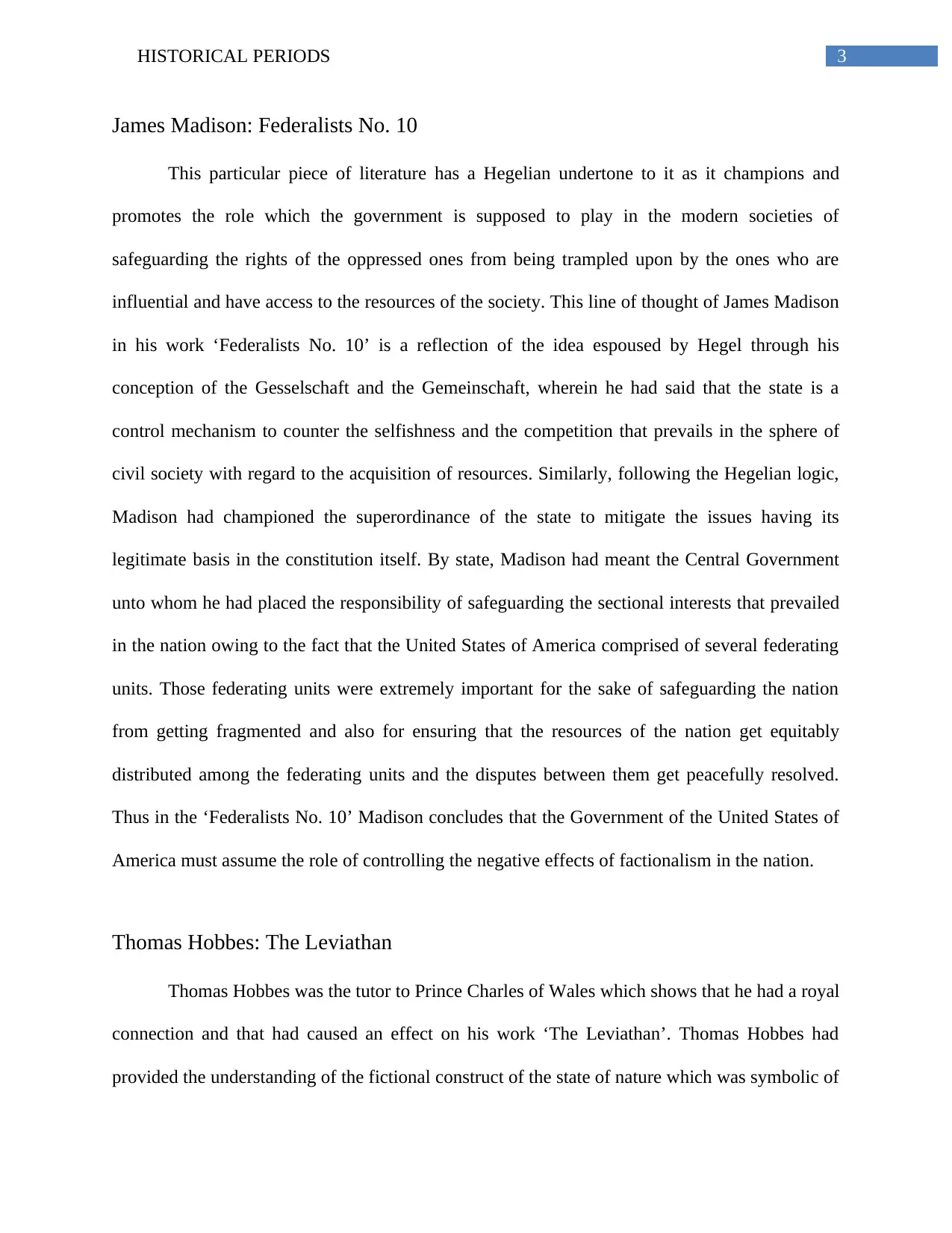
3HISTORICAL PERIODS
James Madison: Federalists No. 10
This particular piece of literature has a Hegelian undertone to it as it champions and
promotes the role which the government is supposed to play in the modern societies of
safeguarding the rights of the oppressed ones from being trampled upon by the ones who are
influential and have access to the resources of the society. This line of thought of James Madison
in his work ‘Federalists No. 10’ is a reflection of the idea espoused by Hegel through his
conception of the Gesselschaft and the Gemeinschaft, wherein he had said that the state is a
control mechanism to counter the selfishness and the competition that prevails in the sphere of
civil society with regard to the acquisition of resources. Similarly, following the Hegelian logic,
Madison had championed the superordinance of the state to mitigate the issues having its
legitimate basis in the constitution itself. By state, Madison had meant the Central Government
unto whom he had placed the responsibility of safeguarding the sectional interests that prevailed
in the nation owing to the fact that the United States of America comprised of several federating
units. Those federating units were extremely important for the sake of safeguarding the nation
from getting fragmented and also for ensuring that the resources of the nation get equitably
distributed among the federating units and the disputes between them get peacefully resolved.
Thus in the ‘Federalists No. 10’ Madison concludes that the Government of the United States of
America must assume the role of controlling the negative effects of factionalism in the nation.
Thomas Hobbes: The Leviathan
Thomas Hobbes was the tutor to Prince Charles of Wales which shows that he had a royal
connection and that had caused an effect on his work ‘The Leviathan’. Thomas Hobbes had
provided the understanding of the fictional construct of the state of nature which was symbolic of
James Madison: Federalists No. 10
This particular piece of literature has a Hegelian undertone to it as it champions and
promotes the role which the government is supposed to play in the modern societies of
safeguarding the rights of the oppressed ones from being trampled upon by the ones who are
influential and have access to the resources of the society. This line of thought of James Madison
in his work ‘Federalists No. 10’ is a reflection of the idea espoused by Hegel through his
conception of the Gesselschaft and the Gemeinschaft, wherein he had said that the state is a
control mechanism to counter the selfishness and the competition that prevails in the sphere of
civil society with regard to the acquisition of resources. Similarly, following the Hegelian logic,
Madison had championed the superordinance of the state to mitigate the issues having its
legitimate basis in the constitution itself. By state, Madison had meant the Central Government
unto whom he had placed the responsibility of safeguarding the sectional interests that prevailed
in the nation owing to the fact that the United States of America comprised of several federating
units. Those federating units were extremely important for the sake of safeguarding the nation
from getting fragmented and also for ensuring that the resources of the nation get equitably
distributed among the federating units and the disputes between them get peacefully resolved.
Thus in the ‘Federalists No. 10’ Madison concludes that the Government of the United States of
America must assume the role of controlling the negative effects of factionalism in the nation.
Thomas Hobbes: The Leviathan
Thomas Hobbes was the tutor to Prince Charles of Wales which shows that he had a royal
connection and that had caused an effect on his work ‘The Leviathan’. Thomas Hobbes had
provided the understanding of the fictional construct of the state of nature which was symbolic of
Secure Best Marks with AI Grader
Need help grading? Try our AI Grader for instant feedback on your assignments.
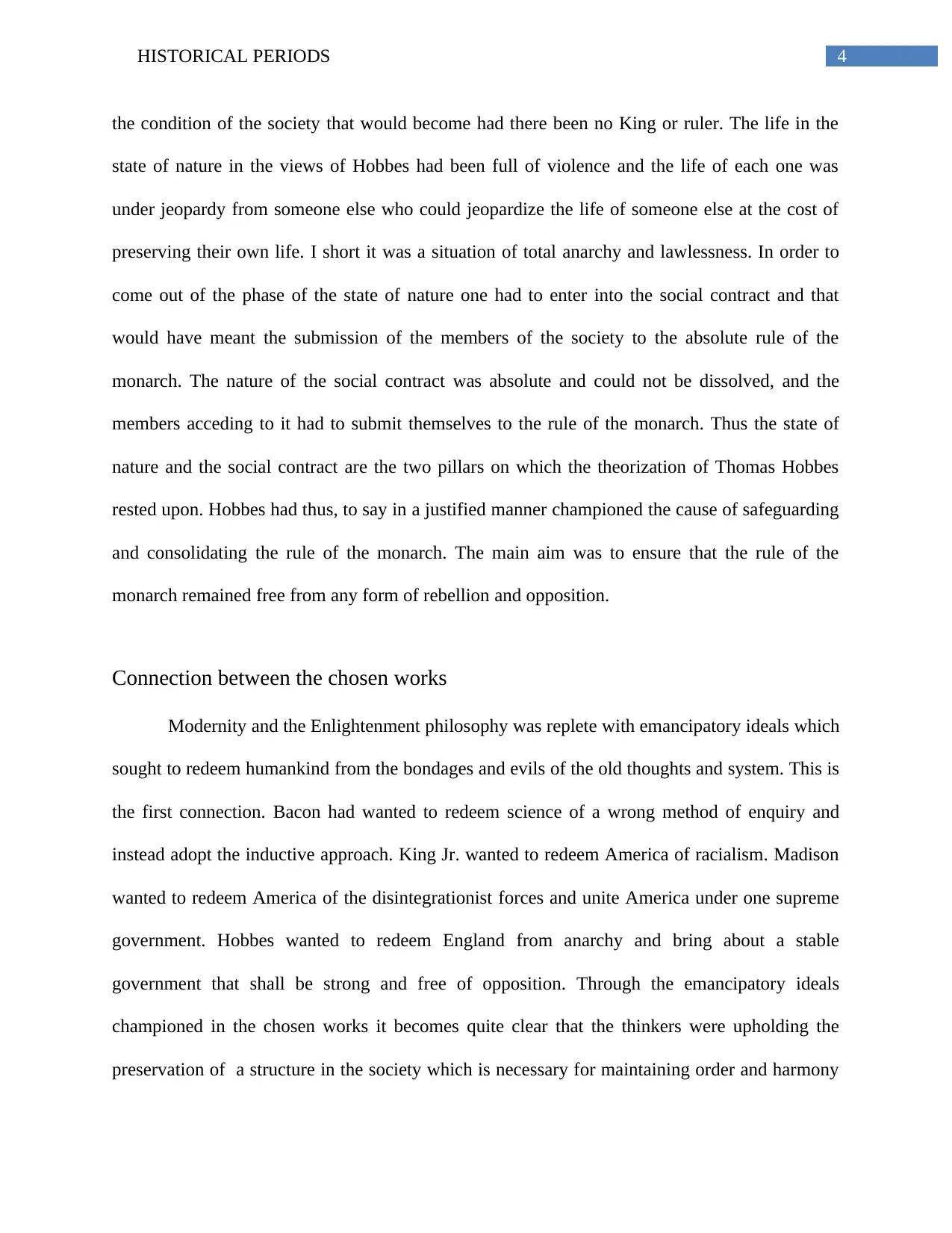
4HISTORICAL PERIODS
the condition of the society that would become had there been no King or ruler. The life in the
state of nature in the views of Hobbes had been full of violence and the life of each one was
under jeopardy from someone else who could jeopardize the life of someone else at the cost of
preserving their own life. I short it was a situation of total anarchy and lawlessness. In order to
come out of the phase of the state of nature one had to enter into the social contract and that
would have meant the submission of the members of the society to the absolute rule of the
monarch. The nature of the social contract was absolute and could not be dissolved, and the
members acceding to it had to submit themselves to the rule of the monarch. Thus the state of
nature and the social contract are the two pillars on which the theorization of Thomas Hobbes
rested upon. Hobbes had thus, to say in a justified manner championed the cause of safeguarding
and consolidating the rule of the monarch. The main aim was to ensure that the rule of the
monarch remained free from any form of rebellion and opposition.
Connection between the chosen works
Modernity and the Enlightenment philosophy was replete with emancipatory ideals which
sought to redeem humankind from the bondages and evils of the old thoughts and system. This is
the first connection. Bacon had wanted to redeem science of a wrong method of enquiry and
instead adopt the inductive approach. King Jr. wanted to redeem America of racialism. Madison
wanted to redeem America of the disintegrationist forces and unite America under one supreme
government. Hobbes wanted to redeem England from anarchy and bring about a stable
government that shall be strong and free of opposition. Through the emancipatory ideals
championed in the chosen works it becomes quite clear that the thinkers were upholding the
preservation of a structure in the society which is necessary for maintaining order and harmony
the condition of the society that would become had there been no King or ruler. The life in the
state of nature in the views of Hobbes had been full of violence and the life of each one was
under jeopardy from someone else who could jeopardize the life of someone else at the cost of
preserving their own life. I short it was a situation of total anarchy and lawlessness. In order to
come out of the phase of the state of nature one had to enter into the social contract and that
would have meant the submission of the members of the society to the absolute rule of the
monarch. The nature of the social contract was absolute and could not be dissolved, and the
members acceding to it had to submit themselves to the rule of the monarch. Thus the state of
nature and the social contract are the two pillars on which the theorization of Thomas Hobbes
rested upon. Hobbes had thus, to say in a justified manner championed the cause of safeguarding
and consolidating the rule of the monarch. The main aim was to ensure that the rule of the
monarch remained free from any form of rebellion and opposition.
Connection between the chosen works
Modernity and the Enlightenment philosophy was replete with emancipatory ideals which
sought to redeem humankind from the bondages and evils of the old thoughts and system. This is
the first connection. Bacon had wanted to redeem science of a wrong method of enquiry and
instead adopt the inductive approach. King Jr. wanted to redeem America of racialism. Madison
wanted to redeem America of the disintegrationist forces and unite America under one supreme
government. Hobbes wanted to redeem England from anarchy and bring about a stable
government that shall be strong and free of opposition. Through the emancipatory ideals
championed in the chosen works it becomes quite clear that the thinkers were upholding the
preservation of a structure in the society which is necessary for maintaining order and harmony
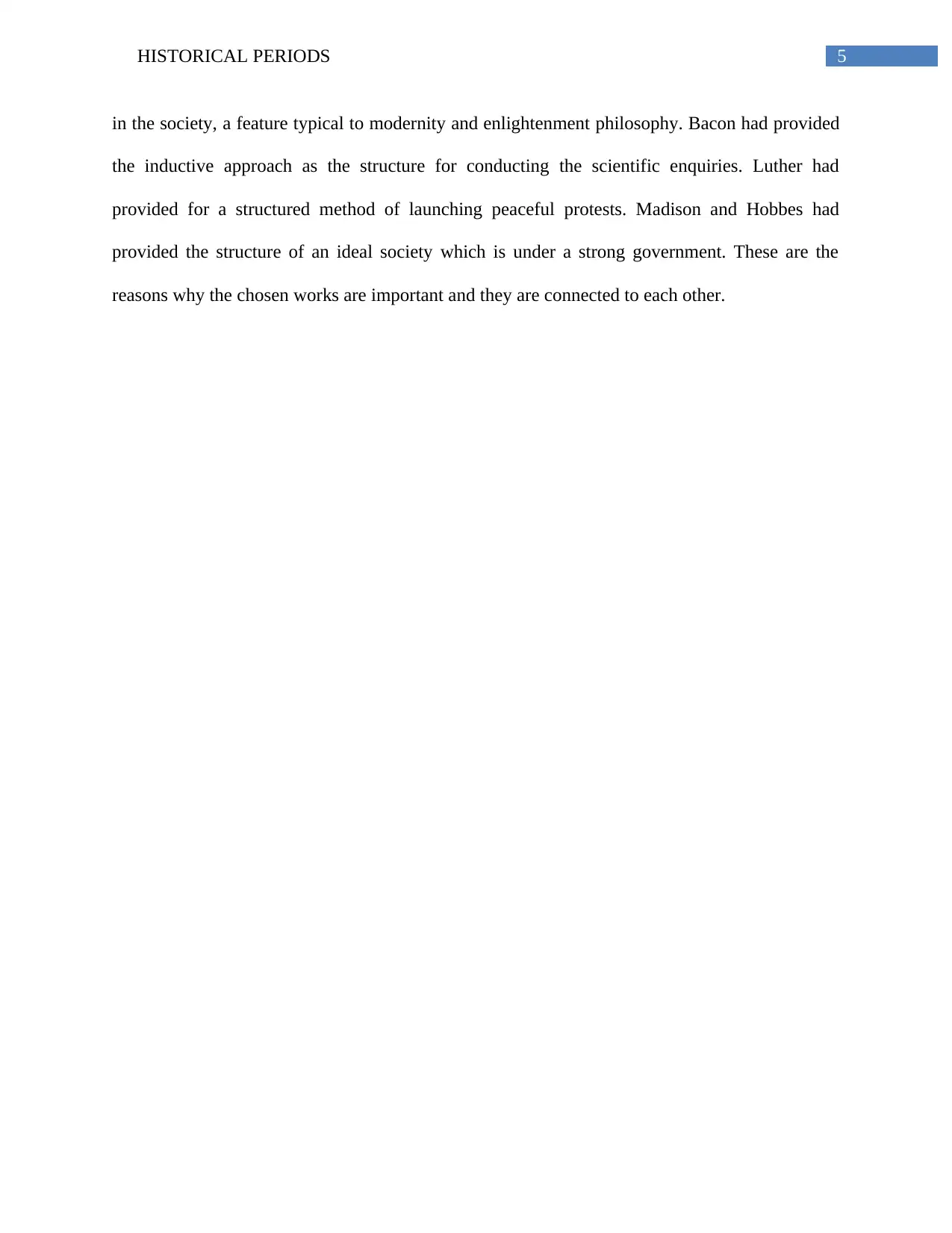
5HISTORICAL PERIODS
in the society, a feature typical to modernity and enlightenment philosophy. Bacon had provided
the inductive approach as the structure for conducting the scientific enquiries. Luther had
provided for a structured method of launching peaceful protests. Madison and Hobbes had
provided the structure of an ideal society which is under a strong government. These are the
reasons why the chosen works are important and they are connected to each other.
in the society, a feature typical to modernity and enlightenment philosophy. Bacon had provided
the inductive approach as the structure for conducting the scientific enquiries. Luther had
provided for a structured method of launching peaceful protests. Madison and Hobbes had
provided the structure of an ideal society which is under a strong government. These are the
reasons why the chosen works are important and they are connected to each other.
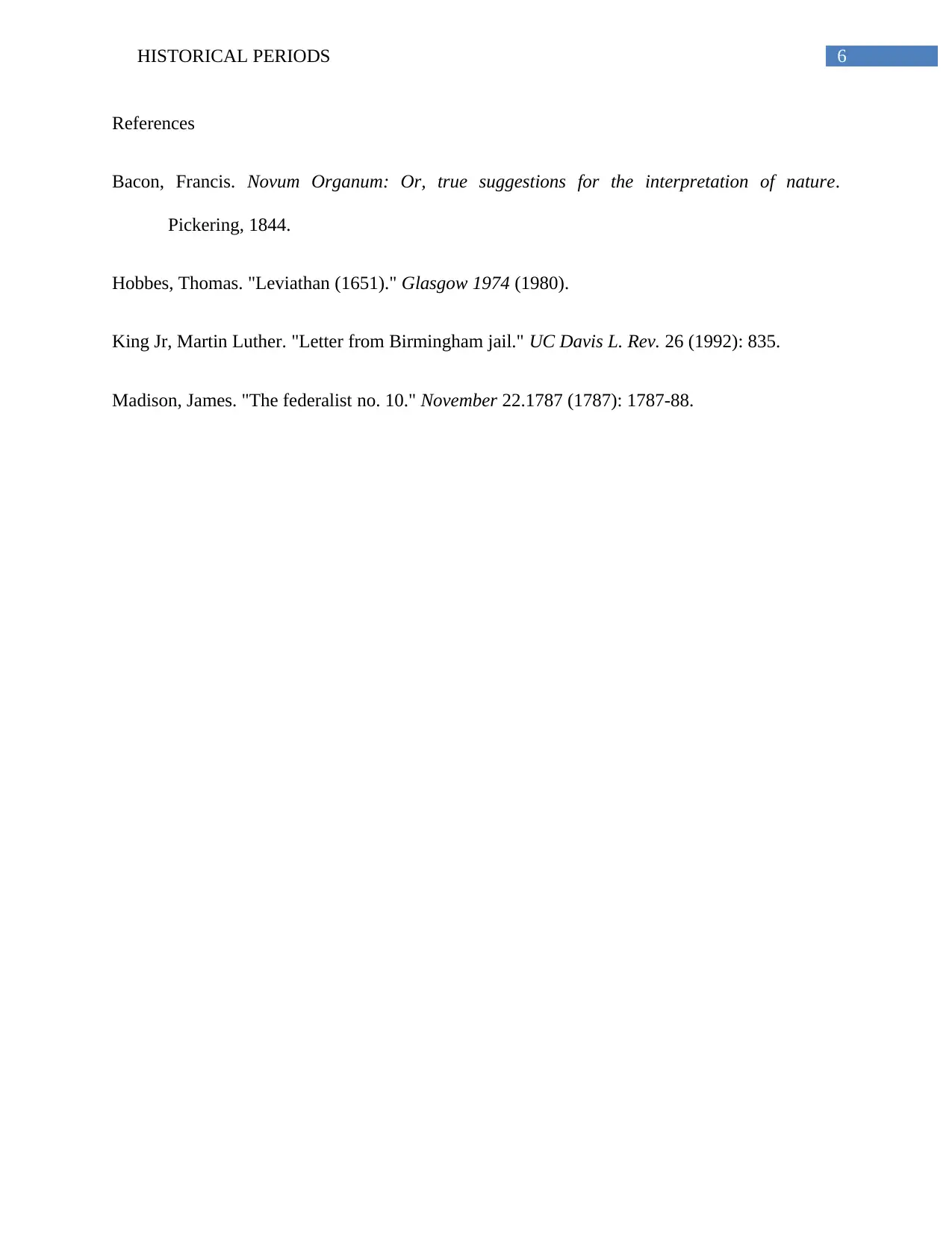
6HISTORICAL PERIODS
References
Bacon, Francis. Novum Organum: Or, true suggestions for the interpretation of nature.
Pickering, 1844.
Hobbes, Thomas. "Leviathan (1651)." Glasgow 1974 (1980).
King Jr, Martin Luther. "Letter from Birmingham jail." UC Davis L. Rev. 26 (1992): 835.
Madison, James. "The federalist no. 10." November 22.1787 (1787): 1787-88.
References
Bacon, Francis. Novum Organum: Or, true suggestions for the interpretation of nature.
Pickering, 1844.
Hobbes, Thomas. "Leviathan (1651)." Glasgow 1974 (1980).
King Jr, Martin Luther. "Letter from Birmingham jail." UC Davis L. Rev. 26 (1992): 835.
Madison, James. "The federalist no. 10." November 22.1787 (1787): 1787-88.
1 out of 7
Related Documents
Your All-in-One AI-Powered Toolkit for Academic Success.
+13062052269
info@desklib.com
Available 24*7 on WhatsApp / Email
![[object Object]](/_next/static/media/star-bottom.7253800d.svg)
Unlock your academic potential
© 2024 | Zucol Services PVT LTD | All rights reserved.



